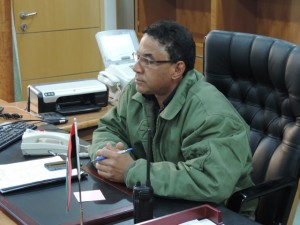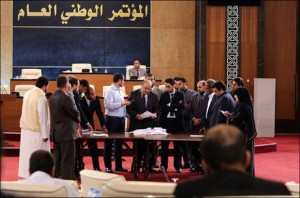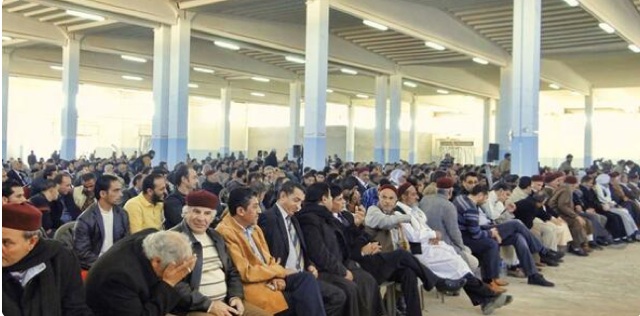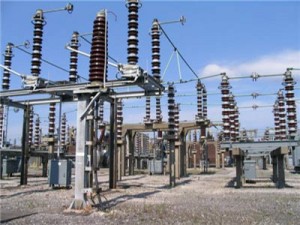| ||||||||||||||||||
Colonel Fethallah al-Gaziri, newly appointed head of military intelligence in Benghazi, shot dead during a family visit.
Last updated: 20 Dec 2013 22:05
| ||||||||||||||||||

Libya has been plagued by growing lawlessness since the 2011 war that toppled Muammar Gaddafi [File: EPA]
| ||||||||||||||||||
| Colonel Fethallah al-Gaziri, the newly appointed chief of military intelligence in Benghazi, has been assassinated during a visit to his family in the eastern Libyan city of Derna. A Libyan security official, speaking to the AFP news agency on condition of anonymity, said on Friday that "unknown assailants opened fire at Colonel Fethallah al-Gaziri... and killed him." The official said al-Gaziri was in Derna for the marriage of a niece. His bullet-riddled body was taken to Derna hospital. No group immediately claimed responsibility for al-Gaziri's killing. Libya has witnessed a string of assassinations and bombings since former Libyan leader Muammar Gaddafi was toppled in 2011. In most cases, the government has been unable to identify the assailants. Derna is known as a stronghold of Ansar al-Shariah, a hardline group suspected to have been behind the September 11, 2012, attack on the US consulate in Benghazi that killed US Ambassador Chris Stevens and three other Americans. Much of recent violence and lawlessness in Libya has been blamed on heavily armed militias with roots in the 2011 war. They have undermined successive transitional governments and parliament, but the government also relies on many of them to provide security in the absence of a functioning police force. Just three 4x4s to patrol 120 Jufra desert weapons stores
By Callum Paton

Hun Libyan Shield Commander Ayed Rehel – “just three 4x4s” (Photo:Aimen Eljali)
Tripoli, 20 December 2013:
TheLibya Shield commander in Hun has said that weapons stores in the desert around Jufra lie at the mercy of gun runners and Al-Qaeda. He added that his forces are already stretched as they combat drugs trafficking, smuggling and illegal immigration.
Speaking to the Libya Herald at his headquarters in Hun, Ayed Rehel, said that he has just three all-terrain vehicles to patrol a region that contains some 120 weapons stores. These arsenals are supposedly under the control of military police in Jufra. However, Rehel said the dumps were poorly-protected and subject to raids.
He admitted that the soldiers protecting these arsenals “are old and lacking in energy and resources”. Rehel went on to explain that the dumps containing small arms were difficult to protect because they had “many access points”.
The commander, who leads a force of just 140 in the Jufra region said his men had not confronted Islamist groups operating through the desert. However, he said he could confirm that Libyans were selling arms, seized from nearby weapons caches, to Al-Qaeda and affiliated groups, moving between Niger, Libya and Mali. These arms, he said, were for the most part, outdated Kalashnikovs.
There are a further 20 weapon stores in the area holding chemical weapons and the raw materials to produce them. These armaments, insisted Rehel, are secure and in the process of being destroyed by the United Nations with the cooperation of Libya Shield.
His force’s main job is pursuing illegal aliens and drug traffickers who cross over the frontiers with Egypt, Mali and Niger. In the last year, it had arrested 270 mostly agricultural workers from sub-Saharan Africa trying to make their way to Europe. He said that the illegals were detained by his men for around 24 hours, during which the detainees are given health checks, before being deported.
“Libyans move them [Illegal immigrants] from the border to Jufra for roughly LD 400.” Rehel explained, “Taxis and big vans will take them from Sebha to the north and Tripoli for LD 850 a person”.
The commander said that his force was spread far too thinly to be truly effective. He said that only extra manpower and the expertise that could only be provided by a highly-trained unit, could meet the challenges
He said that his organisation is more than ready to hand over power to the army and police. Until then, he said, he and his men will work with security forces.
“Then the young men in our force will then return to their studies and their work. Some even now spend four hours at work and then go off to study,” he added.
The Hun commander was optimistic but said that change in the area would take time.
“Before [the revolution] we were not free. We could not talk to the media. We could not express our ideas. We could not hold weapons,” he said, “It has been a good thing that the youth have been able to hold weapons and assert their will. But it will not be long before this will all disappear and life in Libya will return to normal.”
| ||||||||||||||||||
| UN Security Council Concerned At Worsening Security, Political Divisions in Libya 19/12/2013 18:17:00 | ||||||||||||||||||
The UN Security Council has voiced its grave concern at the worsening security situation and political divisions in Libya that threaten to undermine the country's democratic transition, saying in a presidential statement that it was calling on all parties in Libya to support the democratic transition in Libya, including agreement on its immediate next steps, and to engage in political dialogue and refrain from violence and actions that challenge the stability of the State.
Since the ousting of the former dictator, Muammar Gaddafi over two years ago, Libya has been undergoing a democratic transition, and in recent months it has seen increasing acts of violence and worsening security, including the abduction - and subsequent release - of Prime Minister Ali Zidan, the killing of unarmed protesters in the capital, Tripoli, and targeted assassinations in Benghazi. The 15-member body forming the Council emphasised that all parties "must reject violence against civilians and respect the right of all Libyans to peaceful assembly." While noting the withdrawal of some armed groups from Tripoli, the Council called for urgent progress towards an inclusive national approach to disarmament, demobilisation and reintegration into civilian life or integration into state military and security institutions. "The Security Council stresses the urgent need to strengthen military and police institutions in Libya," it added. "In line with the needs and wishes of the Libyan people, the Council supports the efforts of Libyan state forces to restore public security across Libya and counter violence by extremist groups... " Last week, the Secretary-General's Special Representative and head of the UN Support Mission in Libya (UNSMIL), Tarek Mitri, said the continued "precariousness" of security in Libya highlights the need for dialogue between the Government and the main armed militias. "It is essential for all parties to engage in dialogue and create the right balance of incentives in order to stimulate a comprehensive process of reintegration and eventual disarmament," he stated. The Council also welcomed the efforts of Mr. Mitri and UNSMIL to facilitate a meaningful Libya-led national dialogue and strongly encouraged further steps in this regard. "The Council underlines the importance of a single, inclusive national dialogue that can forge consensus on the priorities for securing a transition to democracy and help ensure that all views in Libya are properly taken into account." | ||||||||||||||||||
Commentary on the economic , geopolitical and simply fascinating things going on. Served occasionally with a side of snark.
Saturday, December 21, 2013
Libya disaster just keeps getting worse every day......Colonel Fethallah al-Gaziri, newly appointed head of military intelligence in Benghazi, shot dead during a family visit..... Just three 4x4s to patrol 120 Jufra desert weapons stores ...... UN Security Council Concerned At Worsening Security, Political Divisions in Libya
Subscribe to:
Post Comments (Atom)








No comments:
Post a Comment